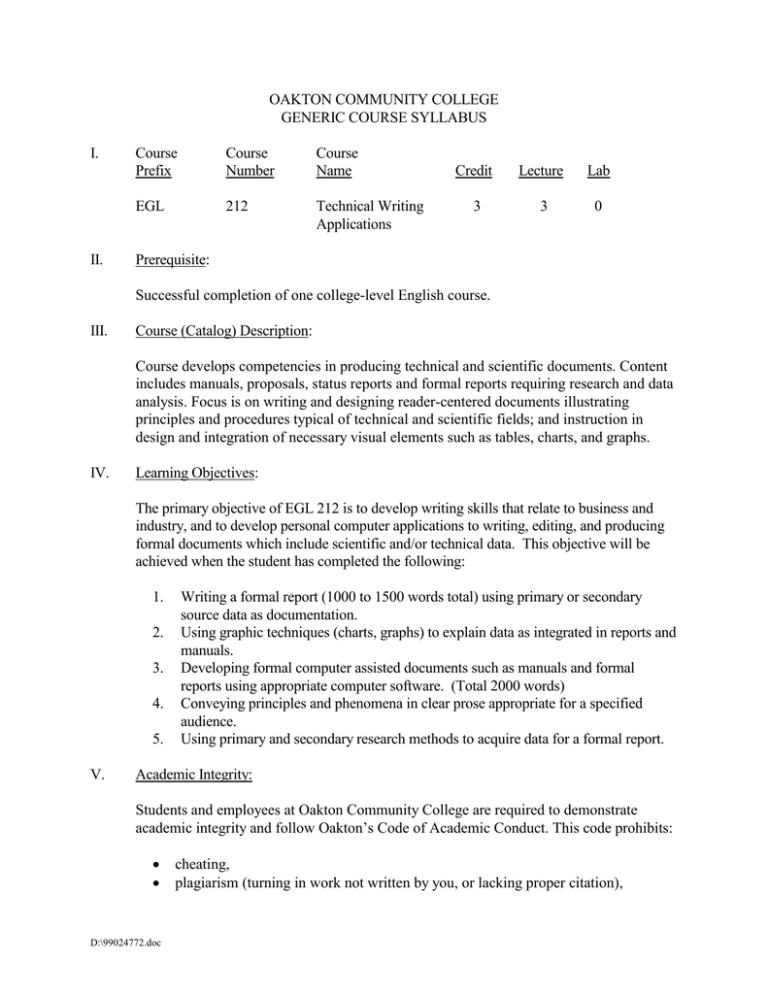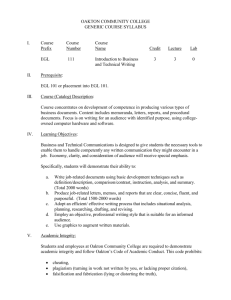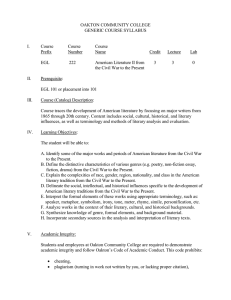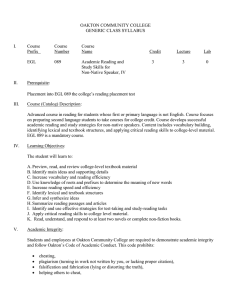OAKTON COMMUNITY COLLEGE GENERIC COURSE SYLLABUS I.
advertisement

OAKTON COMMUNITY COLLEGE GENERIC COURSE SYLLABUS I. II. Course Prefix Course Number Course Name EGL 212 Technical Writing Applications Credit Lecture Lab 3 3 0 Prerequisite: Successful completion of one college-level English course. III. Course (Catalog) Description: Course develops competencies in producing technical and scientific documents. Content includes manuals, proposals, status reports and formal reports requiring research and data analysis. Focus is on writing and designing reader-centered documents illustrating principles and procedures typical of technical and scientific fields; and instruction in design and integration of necessary visual elements such as tables, charts, and graphs. IV. Learning Objectives: The primary objective of EGL 212 is to develop writing skills that relate to business and industry, and to develop personal computer applications to writing, editing, and producing formal documents which include scientific and/or technical data. This objective will be achieved when the student has completed the following: 1. 2. 3. 4. 5. V. Writing a formal report (1000 to 1500 words total) using primary or secondary source data as documentation. Using graphic techniques (charts, graphs) to explain data as integrated in reports and manuals. Developing formal computer assisted documents such as manuals and formal reports using appropriate computer software. (Total 2000 words) Conveying principles and phenomena in clear prose appropriate for a specified audience. Using primary and secondary research methods to acquire data for a formal report. Academic Integrity: Students and employees at Oakton Community College are required to demonstrate academic integrity and follow Oakton’s Code of Academic Conduct. This code prohibits: D:\99024772.doc cheating, plagiarism (turning in work not written by you, or lacking proper citation), Generic Syllabus EGL 212 Page 2 falsification and fabrication (lying or distorting the truth), helping others to cheat, unauthorized changes on official documents, pretending to be someone else or having someone else pretend to be you, making or accepting bribes, special favors, or threats, and any other behavior that violates academic integrity. There are serious consequences to violations of the academic integrity policy. Oakton’s policies and procedures provide students a fair hearing if a complaint is made against you. If you are found to have violated the policy, the minimum penalty is failure on the assignment and, a disciplinary record will be established and kept on file in the office of the Vice President for Student Affairs for a period of 3 years. Details of the Code of Academic Conduct can be found in the Student Handbook. VI. Sequence of Topics: 1. Characteristics of technical writing: measurability, liability, objectivity, precision and compliance. 2. Situational and audience analysis: role of the individual; role of the team member. 3. Graphics in reports: tables, bar graphs, line graphs, pie charts, numerical charts and tables, preliminary layout planning in formal reports. 4. The role of research in technical writing: primary and secondary sources, technical literature, research problems, survey of literature techniques, and primary research methods including note taking, interviews, experiments, and surveys. 5. Planning and organizing: writing and revising a rough draft, how to enter save, print a draft, recall a draft and revise using appropriate software. 6. Thinking and planning: when to use classification, division, or partitions. 7. Proposal writing: statement of the problem, background, objectives, plan of action, facilities and resources, schedule, and costs. 8. Report writing: describing a process, describing a mechanism, analysis of a problem and recommendations for solutions. 9. Manuals: operation manual, service manual, writing for the general public or the specialist. 10. Graphics in manuals: Headings/format/organization, drawings, photographs. During the semester emphasis will be placed on grammar, spelling, mechanics, and organization as the need arises. VII. Methods of Instruction: Course may be taught as a face-to-face, media-based, hybrid, or online course. Lecture, discussion, writing assignments, films, and use of personal computer. D:\99024772.doc Generic Syllabus EGL 212 VIII. Page 3 Course Practices Required: Writing assignments completed (Total of 3000 to 3500 words), attendance required, and use of microcomputer. IX. Instructional Materials: Note: Current textbook information for each course and section is available on Oakton’s Schedule of Classes. Check with the Chairperson for current list. Supplemental Classroom materials. X. Methods of Evaluating Student Progress: Grading of student written work, exercises, and applied desktop publishing technology. Examinations may be used. XI. Other Course Information: Attendance policy For whatever information/procedures the instructor holds the student accountable. If you have a documented learning, psychological, or physical disability you may be entitled to reasonable academic accommodations or services. To request accommodations or services, contact the Access and Disability Resource Center at the Des Plaines or Skokie campus. All students are expected to fulfill essential course requirements. The College will not waive any essential skill or requirement of a course or degree program. Effective beginning term: Fall 2013 Ending term: Syllabus prepared by: Date: Revised by: Date: Reviewed by Chair: Lynn Woodbury Date: March 2006 Approval by Dean: Linda A. Korbel Date: June 2013 D:\99024772.doc


